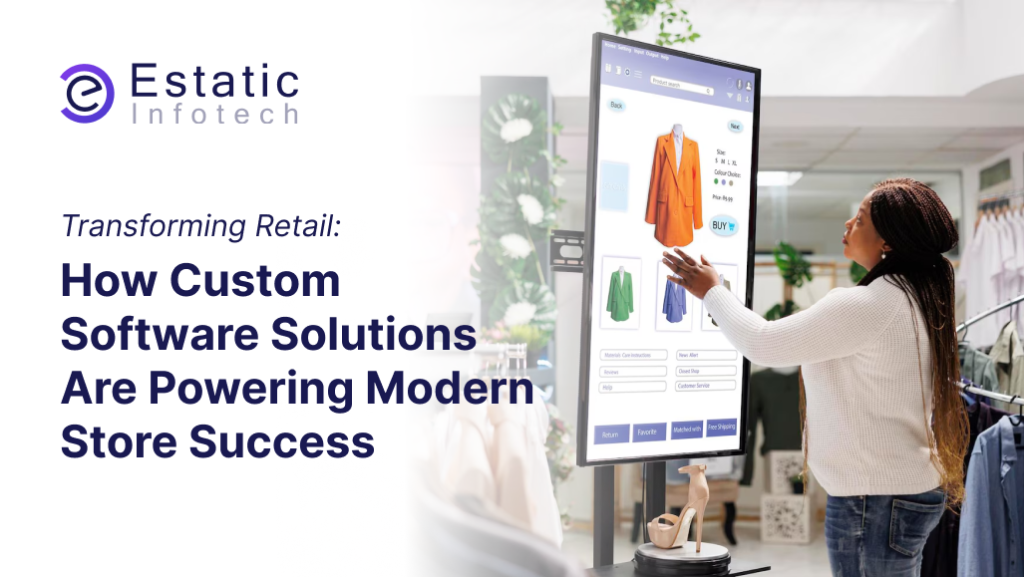In today’s retail landscape, the pace of change is faster than ever. Customers expect seamless experiences whether they shop online, in-store or via mobile. Inventory must be accurate in real-time. Supply chains must be flexible and responsive. In this environment, off-the-shelf retail software often falls short. That’s where custom software steps in.
Tailored to your unique business model, a bespoke solution can transform how your retail operations run, delivering efficiency, agility and better customer experiences.
Table of Contents:
- Retail’s operational challenges today
- What “custom software solutions” mean in the retail context
- Key transformations driven by custom software
- Why retail businesses are shifting to custom development vs off-the-shelf
- How to approach custom software for retail operations (best practices)
- What to look for in a partner and how Estatic Infotech can help
- Conclusion & next steps
Retail’s operational challenges today
Retailers face a variety of operational pain-points:
- The need to synchronise online and physical store operations (prices, inventory, customer data).
- Stock-outs or over-stocking due to disconnected systems, leading to lost sales or excess cost.
- High customer expectations: instant gratification, seamless checkout, consistent experience across channels.
- Manual, repetitive workflows that drain staff time and introduce errors (e.g., returns processing, replenishment, price updates).
- Need for actionable insights from data (customer behaviour, store performance) to compete and grow.
These pressures make it clear: retail operations must evolve.
Key transformations driven by custom software
Here are four major areas where bespoke retail software is transforming operations:
- Custom retail software integrates all business data (online + offline channels, POS, ERP, supply chain) into a unified platform.
- It offers real-time visibility, automation of key workflows, seamless integration across systems, and scalability.
- It adapts to your unique business model (whether you’re a multi-store chain, have strong e-commerce presence, or hybrid physical-digital).
In short, the system becomes a strategic enabler — not just a back-office tool.
Key transformations driven by custom software
Here are four major areas where bespoke retail software is transforming operations:
-
Omnichannel & unified experience
Modern consumers move across channels — browsing online, buying in-store, returning via mobile. Custom software enables a unified experience: syncing product data, inventory, customer profiles and orders across channels.
For example, a customer starts online, looks up in-store availability, buys in-store, and the system recognises them and updates loyalty / profile accordingly. This seamless cross-channel experience builds loyalty and reduces friction.
-
Real-time inventory and supply-chain visibility
Inventory is one of the highest cost and highest risk areas in retail. Custom systems can track stock levels across locations, trigger automated re-orders, identify slow-moving stock and optimise warehouse-to-store flows.
When you know exactly what you have, where it is, and how fast it moves — you can avoid stock-outs, reduce markdowns, and keep margins healthy.
-
Automation of workflows and staff empowerment
By automating recurring tasks (price updates, invoicing, returns processing, staff scheduling), you free up staff to focus on what matters: the customer.
For example: A retail chain uses custom software to automatically adjust staffing levels based on foot-traffic forecasts, freeing managers from manual scheduling.
-
Personalized customer engagement and data-driven insights
Custom solutions let you tap into data: customer behaviour, purchase history, browsing patterns, loyalty interactions. From that you can drive personalised offers, sharper merchandising, targeted campaigns.
Beyond basic analytics, custom software can integrate AI-driven demand forecasting, predictive recommendations, and dynamic pricing — tools which give retailers a competitive edge.
Why retail businesses are shifting to custom development vs off-the-shelf
Off-the-shelf software has value, but it often falls short in key dimensions:
- Limited flexibility or inability to match unique workflows
- Difficult-to-integrate with existing systems (POS, CRM, ERP)
- Generic features (not tuned to your business model)
- Scalability issues as you grow or expand channels
Custom development addresses those issues: it aligns with your business strategy, integrates deeply, scales as you expand, and gives you a tailored competitive advantage.

How to approach custom software for retail operations (best practices)
When you embark on a custom software initiative for retail, following the right approach ensures success. Consider:
- Define your business goals & operational pain-points: Map what needs improvement (inventory accuracy, staff productivity, channel integration).
- Engage stakeholders early: Store managers, supply-chain leads, e-commerce, IT all should be involved.
- Choose the right technology stack & platform: Cloud vs on-premise, mobile apps, integrations.
- Design for scalability: You might start with 10 stores, but plan for 100.
- Ensure seamless integrations: POS, ERP, CRM, e-commerce platforms must work together.
- Test thoroughly and support post-deployment: Custom systems require onboarding, training and ongoing support.
- Measure outcomes: Track KPIs like inventory turn, employee productivity, customer satisfaction, omni-channel sales lift.

What to look for in a partner & how Estatic Infotech can help
When selecting a development partner for your custom retail software, look for:
- Experience in retail operations and multi-channel environments
- Strong integration skills (POS, CRM, ERP, mobile)
- Ability to tailor to your unique workflows, not force you into generic templates
- Post-launch support, maintenance, scalability
- Transparent communication and agile delivery
At Estatic Infotech, we combine deep technical expertise with a clear understanding of retail business challenges. Whether you’re a chain, a specialty retailer or a hybrid digital-physical business, we can develop a solution that aligns with your strategy, drives operational efficiency and enhances customer engagement.
Conclusion & next steps
Custom software solutions are no longer a luxury for a few retailers — they are rapidly becoming a strategic imperative. By aligning your operations, inventory management, sales channels and customer engagement through a bespoke platform, you unlock efficiency, agility and growth.
If you’re ready to take your retail business to the next level, now is the time to act.


